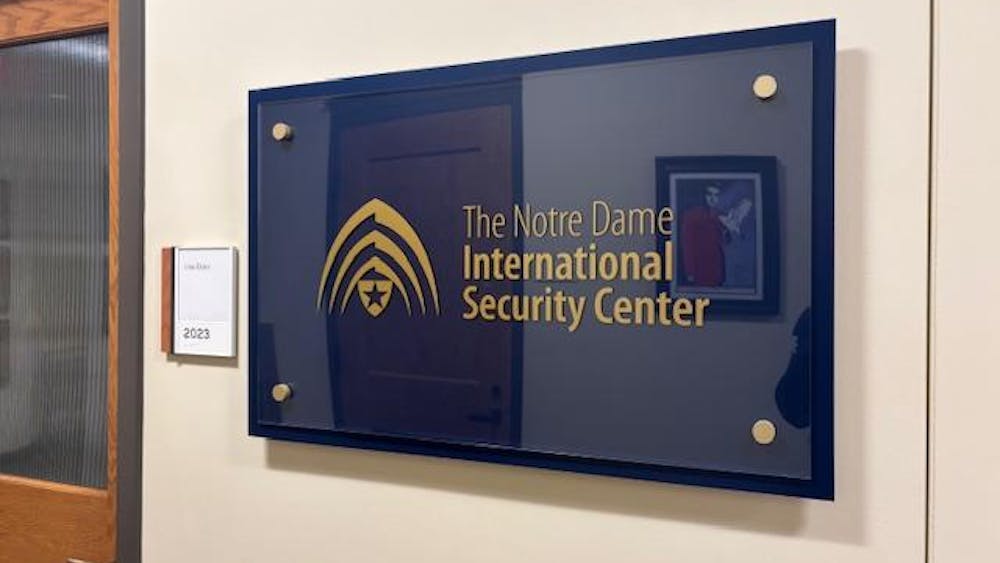Notre Dame Law School presented a panel discussion Thursday morning titled “Protecting All Women’s Rights in the Developing World” in the Eck Hall of Law, co-sponsored by the Klau Institute for Civil and Human Rights, ND Law’s International Human Rights Society, Women’s Legal Forum, Black Law Students Association, Hispanic Law Student Association and Middle Eastern Law Students Association.
Prior to the start of the event, the hallway outside of the lecture hall where the discussion took place was lined with informative posters made by individual members of the LL.M. International Human Rights Law Class of 2023, providing opportunities to learn of women’s rights in situations across the developing world in the Middle East.
The discussion highlighted the Taliban’s war against women and girls in Afghanistan. The panel featured speakers including commissioner Margarette Macauley of the Inter-American Commission on Human Rights, Tahmina Sobat ‘20 LL.M., and Roqia Samim ‘22 LL.M., as well as Christine Venter, director of the Legal Writing Program at Notre Dame Law School and closing remarks by Jennifer Mason McAward, law school professor and director of the Klau Institute for Civil and Human Rights. The discussion was moderated by Diane Desierto, global affairs professor and faculty director of Notre Dame Law School LL.M. Program in International Human Rights Law.
Macaulay was the first to speak on the panel. In addition to being the current Jamaica commissioner of the Inter-American Commission on Human Rights, she was also formerly a judge on the Inter-American Court of Human Rights and is the Organization of American States (OAS) Special Rapporteur on Persons of African Descent and against Racial Discrimination.
Macaulay passionately spoke about how “women’s rights are the future of human life,” because women quite literally are the ones who carry the future of human life inside of them. The women in Afghanistan are victims of receiving less education than men and are unable to hold the same positions of power as the Afghan men.
She stated that she “blames the men” for the issues of women’s inequality in Afghanistan, as they are the ones who hold the power to sustain real change. Macaulay’s call to action was that “we have to do something on an equitable basis” to create change.
Next to speak on the panel was Notre Dame LL.M. 2020 graduate Tahmina Sobat. Sobat is now a doctoral candidate at the University of Minnesota and was formerly with the Afghanistan Independent Human Rights Commission. Sobat was very enthusiastic to return to campus, and recently wrote a letter calling for Afghan women’s protections from the United Nations Human Rights System that was featured by the Special Report for Human Rights Defenders.
The main question that she addressed was asking how we can achieve some kind of transnational solidarity despite the bad experiences of attempts at transnational solidarity that have resulted in war.
“Transnational solidarity can happen in a situation where we should be aware of the inequalities of power, the relations of power and these spaces of solidarity should take the projects of imperialism, colonialism and settler colonialism seriously,” she said.
Roqia Samim, a Notre Dame 2022 LL.M. graduate, was next to speak on the panel. Samim is the first Global Human Rights Fellow at the Notre Dame Law School LL.M. program in International Human Rights Law, and she was formerly with the United Nations Mission to Afghanistan. She presented several devastating pictures and videos that demonstrated the harsh ways that Afghan girls are treated behind closed doors of Afghan universities, as well as how the Afghan girls work to protest and rage against the Taliban. She ended with the important call to action that “ignoring Afghanistan is not a solution,” but rather, “there is a dire need to act against this deep and widespread discrimination based on gender in Afghanistan,” she said.
Closing remarks were delivered by law school professor Christine Venter followed by Mason McAward. Venter acknowledged that it is easy to be overwhelmed by all of the struggles that the Afghan girls and women face, but “the struggle continues, and we can say that we are choosing hope,” she said.
Mason McAward left the audience with an important question regarding the way that Notre Dame students and faculty will grapple with the questions regarding women’s rights issues that all three of the speakers addressed.
“How will those questions form you into a graduate of Notre Dame who does something as a citizen, as a voter, as an advocate to advance the rights of women around our globe?” she asked.
Read More
Trending









